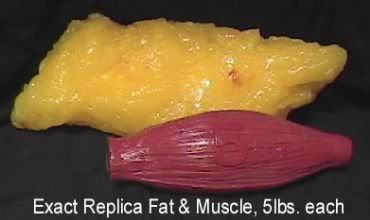Muscle vs Fat or am I doing something wrong?

snewsome7
Posts: 189 Member
I've been working out since June 6. I have been doing cardio and machines and have started taking Kinesis classes.
I bought a scale last night so I could have one at home to weigh on. It says I've gained 3 lbs if I go by the weight on the scale I was using. I have only weighed myself maybe 3 times since I started working out.
How much more does muscle weigh than fat? I have noticed more muscle in my arms especially and my clothes are fitting much better. I'm not upset about what the scale says, I just want to make sure I'm not doing anything wrong.
This scale also measures body fat, so now that I have a starting point, I can see if I'm gaining muscle or fat.
Any advice would be greatly appreciated. Add me too, I can always use the encouragement :]
I bought a scale last night so I could have one at home to weigh on. It says I've gained 3 lbs if I go by the weight on the scale I was using. I have only weighed myself maybe 3 times since I started working out.
How much more does muscle weigh than fat? I have noticed more muscle in my arms especially and my clothes are fitting much better. I'm not upset about what the scale says, I just want to make sure I'm not doing anything wrong.
This scale also measures body fat, so now that I have a starting point, I can see if I'm gaining muscle or fat.
Any advice would be greatly appreciated. Add me too, I can always use the encouragement :]
0
Replies
-
i would say pick a scale and dont compare. You've still lost the same amount of weight. And the odds of you gaining weight from gaining muscle, in this case are quite slim. they're just calibrated differently odds are.0
-
I'm having the same issues. Curious as to what others have to say.0
-
You probably are adding muscle. You're right that it does weigh more than fat, think the difference in size between a pound of lean steak and a pound of butter.
It metabolises more quickly too though, so you will start burning calories quicker, even at rest. If everything else is going the right way (it sounds like it is) then the weight loss will follow.0 -
Bump0
-
If your clothes are fitting better, your body must be getting tighter. Sounds like you're on your way! I would take what you've measured on the scale you have now and stick with it going forward instead of switching up scales. Good luck on your journey.
 0
0 -
i hear ya !! i usually have a loss everyday, but i have started working out more, and i have been here long enough that i should know a difference, but some weeks are worse than others, where i stay the same weight, or i gain a bit..it has got to be muscle, but it still disappoints me a bit, because i am so used to gauging the scale instead of inches..don't worry, if clothes fit better, you are doing something right..i also found this, not sure if it will help or not..best of luck :drinker: http://answers.google.com/answers/threadview/id/576481.html0
-
I had a trainer tell me once that a lb of muscles weighs the same as a lb of fat. A pound is a pound. The important thing is to make sure you measure yourself so that not only your clothes are fitting better, but you can see that the #'s are dropping, even though the scale doesn't say so. Good luck & keep up the great work!!0
-
I would definitely start taking your measurements, since muscle is much more dense than fat, you could be gaining muscle and the scale could be going up, but all the while you would still be shrinking. I also try to watch my sodium/water retention - if I have a lot of sodium it's caused me to "gain" up to 3 lbs in a matter of a day or two, but then it comes right off.0
-
If you started lifting recently and have not been a lifter before you are probably experiencing "newbie gains". Early on people will add muscle much faster as the body adapts to the new exercise. However, if you've gained weight over the course of a month you are probably eating too much. This simple truth is that even with lifting , if you are eating what you should be, there should be some weight loss there.
There's a good chance that what you are taking in is your maintenance level and with the muscle added you've actually gained weight.0 -
You probably are adding muscle. You're right that it does weigh more than fat, think the difference in size between a pound of lean steak and a pound of butter.
It metabolises more quickly too though, so you will start burning calories quicker, even at rest. If everything else is going the right way (it sounds like it is) then the weight loss will follow.
I am confused, how does the burning more calories work...as I keep reading the fitter you are the less calories you will burn?0 -
Well, that's tricky.You probably are adding muscle. You're right that it does weigh more than fat, think the difference in size between a pound of lean steak and a pound of butter.
It metabolises more quickly too though, so you will start burning calories quicker, even at rest. If everything else is going the right way (it sounds like it is) then the weight loss will follow.
I am confused, how does the burning more calories work...as I keep reading the fitter you are the less calories you will burn?
Generally as you workout and lift weights you will add muscle and more muscle does mean more calories burned.
However, fat isn't metabolically neutral. Fat burns calories as well, just not as much. So, if you lose 50 pounds of fat and add 5 pounds of muscle your are likely to still be reducing your needed calorie intake just because of the amount of fat you lost that will no longer be burning calories. Also, you don't burn as much dragging the extra weight around.
The best way to think of this is pound for pound. A man that is 175 and 10% fat will burn a lot more calories than a man that is 175 but 25% fat. So, a more fit person burns more calories pound for pound.0 -
I would definitely start taking your measurements, since muscle is much more dense than fat, you could be gaining muscle and the scale could be going up, but all the while you would still be shrinking. I also try to watch my sodium/water retention - if I have a lot of sodium it's caused me to "gain" up to 3 lbs in a matter of a day or two, but then it comes right off.
Thoroughly agree! Don't be fooled by the scale, if you are eating right and exercising consistently you should be paying attention to the inches, not the weight.0 -
If you got the scale and weighed yourself last night, that's not going to be an accurate number. Most people weigh more in the evening than they do in the morning. And even at that, our bodies fluctuate a few pounds from day to day depending on what we eat or drink.
Plus, no two scales are ever the same.
You know you're doing the right things. Your clothes are fitting better. The number on the scale is irrelevant. 0
0 -
Muscle is heavier than fat, but the difference could just be the scales. Really accurate scales are really expensive. Most home models will vary slightly.0
-
Different scales have different readouts, my dad lost a tone on his scale, till my mum bought a new one and suddely he was back at his start weight. He'd still lost the same, just their old one was a bit more...flattering, shall we say, with the numbers.0
-
THANK YOU EVERYONE!! I feel much better reading all of your responses. It helps to read everyone's comments. I have struggled with my weight for a long time and am trying to take complete control now. It is all a balancing act!0
-
If you got the scale and weighed yourself last night, that's not going to be an accurate number. Most people weigh more in the evening than they do in the morning. And even at that, our bodies fluctuate a few pounds from day to day depending on what we eat or drink.
Plus, no two scales are ever the same.
You know you're doing the right things. Your clothes are fitting better. The number on the scale is irrelevant.
Thank you for your response. Just wanted to let you know I bought the scale last night, but weighed this morning before I ate and everything. Thank you for your encouragement :]0 -
Throw out your scale and go by how you feel and look. Your body won't lie to you!0
-
Muscle is heavier than fat, but the difference could just be the scales. Really accurate scales are really expensive. Most home models will vary slightly.
Muscle is NOT heavier than fat. One pound of muscle = One pound of fat. Muscle, however, is less in "volume." If you burn 1 lb of fat, but gain 1 lb in muscle, you will STILL weigh the same, but you will be smaller.
You just got a new scale. Take your weight. Start measuring in the mornings, instead of the evening. I weigh every day, but I give myself a 3lb window. If I'm up or down 3 lbs, I assume I'm the same weight. Many things like water retention, bowel movements, sodium levels, etc will affect your pound weight differently on a daily basis. Use the scale as a guide to hold you accountable for what you're eating. If my weight flucuates up 1 lb one day, I don't stress about it - but I do find myself choosing healthier foods, drinking more water, and working harder to get in a workout all that day - and that's not a bad thing. Just make sure you don't obsess over it!0 -
I guess the dead horse is still twitching a little. Obviously a pound is a pound. If you're comparing 2 things by mass, then you don't compare the same mass of them. One pound of anything weighs the same as one pound of anything else. You weigh equivalent volumes of them. As you did the reverse, by saying that a pound is less volume.
Muscle is NOT heavier than fat. One pound of muscle = One pound of fat. Muscle, however, is less in "volume." If you burn 1 lb of fat, but gain 1 lb in muscle, you will STILL weigh the same, but you will be smaller.Muscle is heavier than fat, but the difference could just be the scales. Really accurate scales are really expensive. Most home models will vary slightly.0 -
good to hear im not the only one breathe a sigh and keep going but am acquiring a waistline and the bingo wings are smaller ...... so the scales will be used sparingly0
-
Muscle is heavier than fat, but the difference could just be the scales. Really accurate scales are really expensive. Most home models will vary slightly.
Muscle is NOT heavier than fat. One pound of muscle = One pound of fat. Muscle, however, is less in "volume." If you burn 1 lb of fat, but gain 1 lb in muscle, you will STILL weigh the same, but you will be smaller.
You just got a new scale. Take your weight. Start measuring in the mornings, instead of the evening. I weigh every day, but I give myself a 3lb window. If I'm up or down 3 lbs, I assume I'm the same weight. Many things like water retention, bowel movements, sodium levels, etc will affect your pound weight differently on a daily basis. Use the scale as a guide to hold you accountable for what you're eating. If my weight flucuates up 1 lb one day, I don't stress about it - but I do find myself choosing healthier foods, drinking more water, and working harder to get in a workout all that day - and that's not a bad thing. Just make sure you don't obsess over it!
Incorrect. One cubic inch of fat weighs less than one cubic inch of muscle.0 -
You are right. A pound is a pound, it's just the density or volume that is the difference between muscle and fat. I like the poster who said to think of a pound of steak vs. butter. Great analogy!0
-
You are right. A pound is a pound, it's just the density or volume that is the difference between muscle and fat. I like the poster who said to think of a pound of steak vs. butter. Great analogy!
Precisely.0 -
Muscle is heavier than fat, but the difference could just be the scales. Really accurate scales are really expensive. Most home models will vary slightly.
Muscle is NOT heavier than fat. One pound of muscle = One pound of fat. Muscle, however, is less in "volume." If you burn 1 lb of fat, but gain 1 lb in muscle, you will STILL weigh the same, but you will be smaller.
Geez, I don't know why ppl keep posting that!! OF COURSE a pound = pound. That does NOT, I repeat NOT, mean that muscle isn't heavier than fat. It really, really is. Just as a lb of feathers weighing the same as a lb of rocks doesn't mean that rocks aren't heavier. That is why a person of the same height and build with more muscle and less fat that weighs the same as a person with less muscle and more fat will likely be smaller. Becasue the muscle is heavier.0 -
Well, that's tricky.You probably are adding muscle. You're right that it does weigh more than fat, think the difference in size between a pound of lean steak and a pound of butter.
It metabolises more quickly too though, so you will start burning calories quicker, even at rest. If everything else is going the right way (it sounds like it is) then the weight loss will follow.
I am confused, how does the burning more calories work...as I keep reading the fitter you are the less calories you will burn?
Generally as you workout and lift weights you will add muscle and more muscle does mean more calories burned.
However, fat isn't metabolically neutral. Fat burns calories as well, just not as much. So, if you lose 50 pounds of fat and add 5 pounds of muscle your are likely to still be reducing your needed calorie intake just because of the amount of fat you lost that will no longer be burning calories. Also, you don't burn as much dragging the extra weight around.
The best way to think of this is pound for pound. A man that is 175 and 10% fat will burn a lot more calories than a man that is 175 but 25% fat. So, a more fit person burns more calories pound for pound.
Thanks for explaining, not crystal clear but not as confused now!0 -
You are right. A pound is a pound, it's just the density or volume that is the difference between muscle and fat. I like the poster who said to think of a pound of steak vs. butter. Great analogy!
I'm a visual person and this one helped me understand the density/volume part: 5 lb of fat vs. 5 lb of lean muscle.
Both weigh 5 pounds, but I'd take that muslce under my skin over that fat ANY day!
 0
0
This discussion has been closed.
Categories
- All Categories
- 1.4M Health, Wellness and Goals
- 398.5K Introduce Yourself
- 44.7K Getting Started
- 261K Health and Weight Loss
- 176.4K Food and Nutrition
- 47.7K Recipes
- 233K Fitness and Exercise
- 462 Sleep, Mindfulness and Overall Wellness
- 6.5K Goal: Maintaining Weight
- 8.7K Goal: Gaining Weight and Body Building
- 153.5K Motivation and Support
- 8.4K Challenges
- 1.4K Debate Club
- 96.5K Chit-Chat
- 2.6K Fun and Games
- 4.8K MyFitnessPal Information
- 18 News and Announcements
- 21 MyFitnessPal Academy
- 1.5K Feature Suggestions and Ideas
- 3.2K MyFitnessPal Tech Support Questions


















